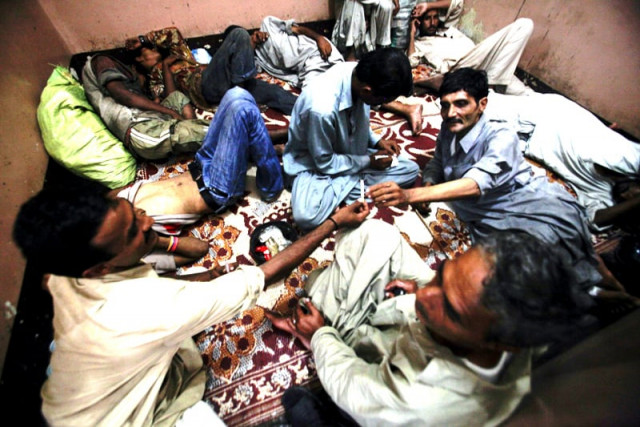Nine cities of Sindh to learn about harmful effects of drugs
UNODC campaign to last five months in province's urban centres

Only Rs4 a year is allocated for each drug addict in the federal budget. PHOTO: REUTERS
The campaign is based on the results of the 'Drug use in Pakistan 2013 survey', which estimated that six per cent of the population in Pakistan, or 6.7 million people, aged between 15 and 64 used drugs in the year the survey was conducted. Sindh had the second highest prevalence rate use of cannabis in the country with 4.3 per cent of the population using cannabis and an estimated 570,000 people in Sindh used opioids during previous years.
Read: Foiled: ANF, Sindh, recovers 40kg heroin

The United Nations Office on Drugs and Crime (UNODC) planned this drug-prevention campaign in nine cities to raise public awareness on drugs and their harmful effects on individuals, families and society at large, with a special focus on youth in educational institutions, teachers, parents and religious leaders.
This campaign is being launched by making use of electronic and print media; installing billboards with drug prevention messages in local languages at strategic locations in the target cities, broadcasting drug prevention messages and talk shows on FM radio and local TV stations, organising drug prevention education sessions with school children, teachers and religious scholars, and establishing a helpline to offer access to drug information and facilitate drug treatment services.
"Preventing drug use before it begins is the most cost-effective, common-sense approach to promoting safe and healthy communities," said Ghalib Bandesha, secretary of the narcotics control division.
"The widespread availability of drugs in Pakistan is making it easy for people to experiment and become dependent on drugs," said UNODC representative Cesar Guedes.
Published in The Express Tribune, August 21st, 2015.



















COMMENTS
Comments are moderated and generally will be posted if they are on-topic and not abusive.
For more information, please see our Comments FAQ